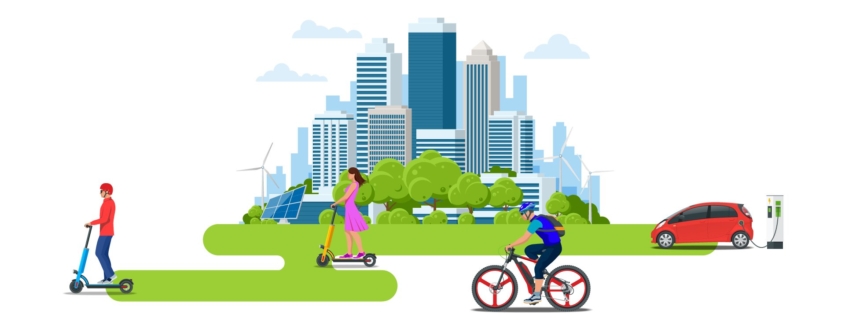How Electric Scooters are Cleaning the Transportation Sector
Cleantech Geek
Be Bold. Make the Change. Have a meaningful Impact.
How Electric Scooters are Cleaning the Transportation Sector
Written by Hubert Pablo – Mearth, Guest Contributor at Cleantech Geek

In just a few years, electric scooters have become the fastest-growing micro-mobility option worldwide. However, the industry has also become one of the most controversial because of its legality and environmental effects. Moreover, some people say it is just an overhyped trend.
However, in just a short period, electric scooters have made their design and features more sustainable, and manufacturers and brands are taking steps to reduce their overall impact on cities and the environment. E-scooter developers have also become more active in engaging with legislators to legalise electric scooters and make them safer for riders.
As the industry continues to improve, micro-mobility solutions like electric scooters will offer more pros than cons for increasingly congested and polluted cities. In this article, we discuss the legal, social, and environmental benefits of electric scooters.
Are electric scooters really eco-friendly?
As previously mentioned, many people doubt if electric scooters truly have a positive impact on the environment. It’s also important to mention these as it shows the challenges and limitations of electric scooters if it’s not addressed properly.
Research published by North Carolina State University studied the life cycle of shared electric scooters and found that they are not eco-friendly transportations. The study also concluded that the total carbon footprint of e-scooters for their whole lifecycle is around 202g of carbon dioxide per kilometre and passenger.
There are plenty of factors that contribute to this high number. These include heavy vehicle production, transporting shared e scooters for recharging, and the electric scooter’s lifespan. All of these factors contribute to the negative effects of shared electric scooters in cities.
However, it’s also important to note that this research and most complaints about electric scooters refer to shared electric scooters. The effects would be different if it were a personal electric scooter. After all, owning an electric scooter eliminates the issue of transportation for recharging e-scooters and their lifespan. Personal eco-friendly scooters are durable and well-maintained, so they would last longer than shared e-scooters.
If manufacturers and legislators can continue to work together to create sustainable shared electric scooters, it would make a difference to the city’s pollution and rider’s safety.
E-scooters help clean the transportation sector
When it comes to riding personal electric scooters, here are the different ways that it can clean the environment and the transportation sector.
Helps eliminate air pollution
With road transportation as one of the primary sources of carbon emissions in cities, electric scooters will help reduce this amount significantly since it does not emit any harmful gases.
In fact, a study showed that using e-scooters in cities can reduce around 330 tons of carbon emissions per year. The study also says that adopting e-scooters in cities could save over 10,000 carbon emissions by 2030.
Moreover, using electric scooters and other micro mobile solutions in cities will not only reduce pollution but also positively impact the health and quality of living of the people.
Reduces traffic congestion
Another pain point that electric scooters can solve in the transportation sector is traffic congestion. It is not only inconvenient but also harmful to the environment as cars and buses produce more emissions due to traffic. In Australia, road congestion could cost $39 billion by 2031 if it’s not addressed.
Transportation authorities agree that e-scooters will help resolve traffic congestion in cities as they can be used to travel short distances. E-scooters can provide a fast and efficient ride for short trips and cut the number of cars on the road. Moreover, e-scooters don’t take up much space, so allowing them to roam around in the streets will not cause congestion.
Allows people to reclaim spaces
With more car owners living in dense cities with limited space, most cars are parked along the streets and other public spaces. However, since electric scooters don’t take up much space in the streets, e-scooters could help reclaim sidewalks and public spaces for pedestrians.
Moreover, if the law legalises and promotes electric scooters, this could also give way to building infrastructures or paths specifically for micro mobile transportations. As a result, electric scooter and bicycle riders can have their lane, pedestrians are free to walk on sidewalks, and cars will have more space on the road.
Pushing for micro-mobility solutions
Finally, if more cities legalise and support electric scooters, it could pave the way for the development of more sustainable and efficient micro mobile transportations and policies. Using green technology can make the environment greener by improving e-scooter manufacturing. Moreover, legalising and standardising electric scooter laws will ensure the safety and protection of electric scooter riders across cities.
Other benefits to legalising e-scooters are the economic impact it could bring to cities. With a more cost-effective and efficient mode of personal transportation available, locals and tourists can travel around the city and visit more shops and attractions.
Electric scooters bring more than an environmental impact
Electric scooters may currently have a few more carbon emissions in their overall life cycle. However, once manufacturers and legislators work together to minimise these emissions, electric scooters can bring more than just a positive impact to the environment.
As mentioned above, e-scooters can also help eliminate traffic, provide more public space for pedestrians, improve a city’s economy, and push for the development of more micro mobile solutions. However, all of these are only possible with the collaboration and support of manufacturers, legislators, and the public.
If you’re interested in purchasing an e-scooter, test out an e-scooter in your local electric scooter shop today.
This is a guest contribution by Mearth Technology, Australia’s first e-scooter developer providing scooters that redefine transportation. Launched in 2015, Mearth continues to research, design, and produce e-scooters that cater to all kinds of riders, from everyday commuters to off-road travellers. Today, Mearth continues its mission to provide quality, sustainable, and fun electric scooters for Australia.




